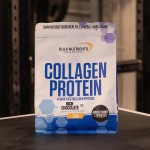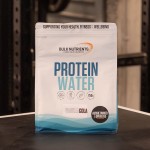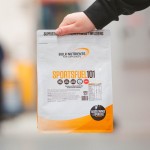Collagen Support for Healthy Ageing

What Is Collagen?
Collagen is the most abundant protein in the human body - and it’s kind of a big deal. Think of it as the scaffolding that keeps everything supported and springy. We’re talking skin, joints, bones, muscles, hair, nails, even your gut lining.
While our bodies are great at making collagen naturally, production slows down as we age (thanks, biology). The good news? You can top it up through collagen-rich foods like chicken skin, fish skin, and bone broth - or take it as a supplement for a more convenient daily boost.
You’ll also spot collagen in skincare products thanks to its moisturising and humectant properties, but for structural support from the inside out, it’s what you consume that counts.
What Causes Collagen Loss?
Here’s the thing - from our mid-20s, collagen production naturally starts to slow down. It’s a gradual process, but by the time we hit our 30s, 40s, and 50s, the effects can become more noticeable.
While collagen loss is a normal part of ageing, a few lifestyle and environmental factors can speed things up:
- Smoking
- Excess alcohol
- Diets high in sugar and ultra-processed foods
- Chronic stress
- Too much sun (yep, UV rays do more than just burn)
- Hormonal shifts - especially around perimenopause and menopause. Oestrogen helps regulate collagen levels, so when it starts to dip, collagen often follows suit.
And what does collagen decline actually look like?
- Fine lines and wrinkles
- Drier, less elastic skin
- Brittle nails
- Thinning or dull hair
- Joints that creak more than they used to
Sound familiar? You’re definitely not alone. But the good news is, collagen support can help soften some of these changes.

Why Collagen Supplements Are Worth Considering
Daily collagen supplements, particularly collagen peptides (also known as hydrolysed collagen), can help replenish the natural stores your body starts to lose over time.
These peptides are broken down into smaller, easily absorbed amino acids that your body can use to support collagen production from within. Think of it as topping up your internal toolkit - helping your skin, joints, hair, and nails feel more like you again.
And yes, the science stacks up - especially in women-focused studies, showing benefits for skin elasticity, hydration, and joint comfort. It’s not a miracle cure, but for many women, it’s a worthwhile daily ritual.
How Collagen Supports Skin Health
Let’s talk skin - because that’s often where collagen’s impact is easiest to see (and feel). Studies show that collagen supplements can support skin hydration, improve elasticity, and help reduce the appearance of fine lines. In short, they can help bring back that healthy, supple glow.
One major review published in Nutrients in 2023 looked at 26 studies involving over 1,700 participants - 93% of whom were women aged between their 20s and their 70s. The results? Those taking hydrolysed collagen showed significant improvements in hydration, elasticity, and wrinkle depth compared to those on a placebo. They also noted that the effects appeared more pronounced in women over 30 or 40 years old, which aligns with natural collagen decline due to ageing.
While every skin story is different, the science is clear: consistent collagen support can go a long way in how your skin looks and feels.
Stronger Hair & Nails with Collagen
Split nails and thinning strands? Collagen might be your new secret weapon.
Research shows that collagen can help support stronger hair follicles and boost nail resilience over time.
In a 2017 study, women who took collagen supplements daily for 24 weeks saw increased nail growth and a noticeable drop in breakage.
Emerging research also suggests that oral collagen supplementation may help support hair health by helping to maintain healthy hair follicles and potentially keeping hair in its growth phase for longer.
While more clinical studies are needed to confirm these effects in real-world settings and refine dosage, it’s a promising area for women looking to strengthen and maintain healthy hair over time.
Collagen for Joint & Bone Health
Feeling stiff or sore? Collagen could be part of the solution.
Collagen plays a key role in maintaining healthy cartilage and connective tissue, helping to reduce joint discomfort and support smoother movement. It’s particularly helpful as we get older or increase our activity levels (because knees aren’t what they used to be).
In a 2024 clinical trial, people with knee osteoarthritis who took hydrolysed collagen daily reported less joint pain and improved mobility compared to those on a placebo. The study also showed better overall joint function, making collagen a promising tool for supporting everyday comfort and long-term musculoskeletal health.
And it’s not just about joints - a 2018 study published in Nutrients found that daily collagen peptides helped improve bone mineral density and supported overall bone health in postmenopausal women. That means collagen may help maintain bone strength and slow down age-related bone loss.
In short: your joints and bones will thank you.
Bonus Benefits
Beyond skin, joints, and hair, collagen has a few extra tricks up its sleeve. While research is still emerging in some areas, here are a few other ways collagen might support your overall wellbeing:
- Gut health: Collagen contains amino acids like glycine and glutamine, which may help strengthen the gut lining - especially useful if you're managing gut sensitivity or aiming for better digestion.
- Muscle recovery: When paired with resistance training, collagen peptides may help support muscle repair and recovery - especially in those looking to maintain lean muscle mass as they age.
- Body composition: Some studies suggest collagen may support fat-free mass and improve body composition in older adults or those in calorie-deficit phases.
In short, it’s not just about glowing skin - collagen could play a broader role in how you feel and function daily.

Collagen for Perimenopause, Menopause, & Postmenopause
Collagen loss happens gradually as we age - but during perimenopause, menopause, and postmenopause, that decline can accelerate quickly. Why? It all comes down to hormones, particularly oestrogen.
What Do These Stages Actually Mean?
- Perimenopause is the lead-up to menopause when hormone levels start to fluctuate. It can begin as early as your mid-30s but most often starts in your 40s.
- Menopause is reached after 12 consecutive months without a period, usually between ages 45 and 55.
- Postmenopause is everything after that - when hormones stabilise but stay at lower levels.
Why Oestrogen Matters for Collagen
Oestrogen helps stimulate collagen production and plays a key role in maintaining skin thickness, elasticity, and hydration. So when oestrogen drops, collagen takes a hit - not just in the skin but also in joints, bones, tendons, and connective tissue.
Common signs of collagen loss around this time include:
- Wrinkles and sagging skin
- Dry or thinning skin
- Slower wound healing
- Joint stiffness or reduced flexibility
In fact, research shows women can lose up to 30% of their skin’s collagen in the first five years after menopause. After that, the decline continues at around 2% per year - steady but significant over time.
Can Collagen Help?
Yes - supplementing with collagen can help support your body through these hormonal changes. It’s not a cure-all, but it can offer real benefits when it comes to skin, joint, and connective tissue support.
If you’re using Hormone Replacement Therapy (HRT), the good news is that collagen supplements are considered safe to take alongside it. HRT is known to support skin elasticity and thickness, and collagen may offer complementary benefits - potentially helping to reinforce those effects from within.
Early-stage research also suggests collagen could help manage some of the metabolic changes linked to menopause. One animal study found that collagen hydrolysate helped reduce weight gain and fat accumulation in estrogen-deficient models - an intriguing finding for anyone navigating the shifts in body composition that can come with this stage of life.
How to Take Collagen (Without Even Thinking About It)
We get it - with so many supplements out there, the last thing you need is another complicated routine. That’s why we keep things simple.
Bulk Nutrients Collagen Protein is:
- Neutral in flavour – our unflavoured version blends seamlessly into coffee, smoothies, baked treats, and even savoury dishes
- Flavoured versions to suit every sweet tooth – from rich chocolate to refreshing apple & blackcurrant
- Effortless to mix – no clumps, no gritty texture
- Convenient – just one scoop a day is all you need
It’s the kind of wellness habit that actually sticks - no fuss, no fancy prep. Just a small step each day to support your skin, joints, and overall wellbeing.
Collagen: Small Habit, Big Impact
From smoother skin to stronger nails, joint comfort to bone support - collagen really does a bit of everything. It’s one of those supplements that works quietly in the background, helping your body feel and function at its best.
As we age, collagen levels naturally decline - especially during key hormonal changes like perimenopause and menopause. But the good news? Topping up with collagen hydrolysate can offer real, research-backed support.
Whether you’re just starting to notice the signs of ageing or looking to maintain the progress you’ve made, collagen is an easy addition to your routine - and one that tends to stick. Especially when it’s simple, affordable, and made with quality in mind.

Nick is Bulk's Customer Service team's Technical Support Officer.
Which is our way of saying he's the guy whose job it is to answer your obscenely technical supplement questions.
More about Nick TelescaReferences:
- de Miranda RB, Weimer P, Rossi RC. Effects of hydrolyzed collagen supplementation on skin aging: a systematic review and meta-analysis. Int J Dermatol. 2021 Dec;60(12):1449-1461. doi: 10.1111/ijd.15518. Epub 2021 Mar 20. PMID: 33742704. https://pubmed.ncbi.nlm.nih.gov/33742704/
- Hexsel D, Zague V, Schunck M, Siega C, Camozzato FO, Oesser S. Oral supplementation with specific bioactive collagen peptides improves nail growth and reduces symptoms of brittle nails. J Cosmet Dermatol. 2017 Dec;16(4):520-526. doi: 10.1111/jocd.12393. Epub 2017 Aug 8. PMID: 28786550. https://pubmed.ncbi.nlm.nih.gov/28786550/
- Pappelbaum, K. I., Virgilio, N., Epping, L., Van der Steen, B., Jimenez, F., Funk, W., Prawitt, J., & Bertolini, M. (2024). Revealing novel insights on how oral supplementation with collagen peptides may prevent hair loss: Lessons from the human hair follicle organ culture. Journal of Functional Foods, 116, 106124. https://www.sciencedirect.com/science/article/pii/S1756464624001269
- Carrillo-Norte, J. A., Gervasini-Rodríguez, G., Santiago-Triviño, M. Á., García-López, V., & Guerrero-Bonmatty, R. (2025). Oral administration of hydrolyzed collagen alleviates pain and enhances functionality in knee osteoarthritis: Results from a randomized, double-blind, placebo-controlled study. Contemporary Clinical Trials Communications, 43, 101424. https://www.sciencedirect.com/science/article/pii/S2451865424001716
- König D, Oesser S, Scharla S, Zdzieblik D, Gollhofer A. Specific Collagen Peptides Improve Bone Mineral Density and Bone Markers in Postmenopausal Women-A Randomized Controlled Study. Nutrients. 2018 Jan 16;10(1):97. doi: 10.3390/nu10010097. PMID: 29337906; PMCID: PMC5793325. https://pmc.ncbi.nlm.nih.gov/articles/PMC5793325/
- Chiang TI, Chang IC, Lee HH, Hsieh KH, Chiu YW, Lai TJ, Liu JY, Hsu LS, Kao SH. Amelioration of estrogen deficiency-induced obesity by collagen hydrolysate. Int J Med Sci. 2016 Oct 19;13(11):853-857. doi: 10.7150/ijms.16706. PMID: 27877077; PMCID: PMC5118756. https://pmc.ncbi.nlm.nih.gov/articles/PMC5118756/
Related Blogs

What is Hydrolysed Collagen?
Posted by Nick Telesca
Estimated reading time: 5 minutes

Discovering Collagen Hydrolysate: More Than Just Anti-Aging
Posted by Nick Telesca
Estimated reading time: 6 minutes

What Are Collagen Peptides and How Do They Help?
Posted by Ben Crowley
Estimated reading time: 11 minutes






























